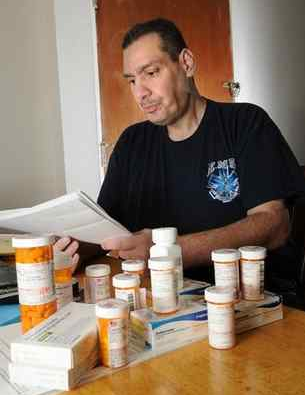Five Hints to Make the Most of Your Office
Visit
-
Bring your questions. Before your appointment, write down any questions or concerns that you want to talk about. Chooses the three most important to ask first.
- Bring a list of all of your current medications, including all over-the-counter herbs and supplements. Include the name, dosage, who prescribed it, why you are taking it and for how long. Also bring the names of all treating medical clinicians, your pharmacy of choice, and any prior surgeries and hospitalizations.
- Bring your family medical history. Be sure your family health history is up-to-date. Share any changes or new conditions of your family members with your doctor. Your family history helps to predict your risk for disease.
- Be honest. Many medical conditions are uncomfortable to discuss. Even so, it is very important to be able to speak openly with your clinician. Leaving out details or lying to your doctor can be bad for your health because it can lead to inappropriate care.
- Bring a care partner with you to your appointment. Healthcare uses a difficult to comprehend language. There are many new words, acronyms and treatments. There is often a lot of novel information shared in your 15 minute appointment. If someone else is able to come with you and act as a note-taker and a second set of eyes and ears, miscommunications are less likely to occur. When no one is able to join you, and even when they are, you should audio record conversations on your cell phone so that there will a clear record of what was said later.
|
Do Doctors say "I'm Sorry"?
A relatively
recent study found that most doctors are still unlikely to admit their role in a medical mistake nor would they offer an apology.
This nation-wide study,
published last fall in the journal BMJ Quality and Safety, posed two hypothetical situations to over 300 primary care physicians. Each situation involved medical error and the physicians were asked how they would react.
In the first situation, the patient had breast cancer, but the diagnosis was delayed due to error. The second situation involved a delayed response to a patient's symptoms due to a breakdown in care coordination and communication.
Over 70% of the physicians surveyed said they would provide "only a limited or no apology, limited or no explanation, and limited or no information about the cause." The study found that a lot depended upon how serious the clinician thought that the error was. In reality, the culture of patient safety in medicine still dislikes admitting mistakes, usually on the pretense of fear of malpractice lawsuits. In reality, the number of malpractice lawsuits and payouts for medical malpractice has been decreasing over the years.
Based on an article by Lawrence Schlachter, MD. A board-certified physician, a medical malpractice attorney, and the author of "
Malpractice3: A Neurosurgeon Reveals How Our Health-Care System Puts Patients at Risk" (Skyhorse Publishing, January 2017).
|
|
Support our Patient Safety Work. Support CTCPS.
We Rely on Donors Like You.
|
|
|
Dear Members,
They say that March come in like a lion and goes out like a lamb. While Tuesday looks like it will be quite stormy here in the Northeast, most of us will be inside keeping warm. I would like to focus your attention on another important event that is taking place from March 12 - 18th. It is Patient
 Safety Awareness Week. During this week efforts will be made to raise patient safety awareness among both health care professionals and the public.
During this week, we encourage professionals to wear patient hospital gowns to visibly raise awareness of patient safety issues and to encourage conversations.
We encourage Patients and Consumers of health care to also participate in a number of ways. Share these events with your friends, colleagues and your health care providers.
Participate in the national Twitter chat on Tuesday March 14th at 1:00pm entitled: Patient Safety: What Patients Want (and Need) to Know. J
oin Tuesday's Twitter chat with
#PSAW17chat
. The Connecticut Center for Patient Safety uses the Twitter ID @CTPatientSafety. and we look forward to seeing you there.
On the NPSF website, there are a number of resources for patients which can be accessed here.
Send an email to CTCPS to share your story. We have found that the personal narratives make a heartfelt impression on health care professionals and share them to raise patient safety awareness. We appreciate stories of times when medical harm occurred and also those when a good patient safety event occurred.
Finally you can make a donation to support our work in the name of someone who has been impacted by a patient safety issue.
Most importantly, remember that patient safety day needs to be EVERY day! Talk with your providers and let's keep these conversations going!
Lisa Freeman,
Executive Director
|
|
|
A patient's patient safety story:
When premature closure (stopping an inquiry too soon) put a patient in jeopardy.
submitted by: Joseph Tomaso
On January 6, 2017, I was a patient in the Emergency Department of a Connecticut hospital because I was experiencing chest pain. I was left suffering in the ED waiting room for five hours. At the time, I could not
 understand why I was not being treated as an emergency. Since being released, I have figured out what happened.
My medical history is extensive, and much of it had taken place at this same hospital. When the triage nurse was asking me about my medical history, I shared that I had Hepatitis C and cirrhosis. I was asked about my meds. Apparently having Hep C and being on Buprenorphine tripped some type of "alarm" with the nurse. "Wait in the waiting area and someone will be with you" I was told. And wait I did - for 5 long hours.
The nurse involved in my intake took it upon himself to enter into my medical record that I was opioid dependent, most likely because I have Hepatitis C and take Buprenorphine (a medication most often given to opioid addicts to help them into recovery). In fact, I am most definitely not now nor ever was addicted to opioids. I contracted Hepatitis C as a Paramedic while I was on the job. I use the Buprenorphine to treat my pain. The nurse who put this into my chart not only caused me to be placed non-emergent in the waiting area, but caused me to suffer in pain for over 24 hours. I was refused pain management in the ED and I received no pain management in the Chest Pain Center either. It wasn't until I started experiencing an irregular heart-rate in the chest pain center that I was moved back to a higher level of care and my current chest pain was taken seriously.
I was not an addict looking for a fix. In fact, I have many YEARS of lab work where I was routinely tested for drugs due to my being on a wait list in a national transplant program. Needless-to-say, they have always been negative. Ironically, after a career of saving lives, this one employee's assumption, which was entered into my medical record, caused me to receive inappropriate care in the ED and also caused me to have to worry about my own placement for a lifesaving transplant. A nurse who had jumped to a wrong conclusion and did nothing to confirm or question it, took such a potentially life altering action putting my life in immediate and long-term jeopardy. Fortunately, I understand that the misinformation in my record has been corrected and I did not lose my place on the transplant waiting list. My experience highlights the importance of accurate communication and how rushing to a conclusion can go so wrong!
|
|
|
Talking About Advanced Care Planning
This is a conversation that many people find very uncomfortable. It is also a conversation that is ever so important to have. With technology and medical advances, today we are living longer lives, with the average American reaching
nearly 79 years old. At the same time, while some of us stay relatively healthy, many are dealing with health challenges in these advanced years. This makes it more important than ever if we want our personal preferences to be honored during these last years that they be identified and shared. The conversation that we want to encourage you to have
begins with an awareness of the different alternative settings that people are living in and the choices about how you can live your life during
 |
|
 |
Benson WF and Aldrich N. Advance Care Planning_ Ensuring Your Wishes Are Known and Honored If You Are Unable to Speak for Yourself_ Critical Issue Brief_ Centers for Disease Control and Prevention. 2012. www.cdc.gov_aging |
your last years. As Atul Gawande, author of an excellent book,
Being Mortal
said, "Our ultimate goal, after all, is not a good death but a good life to the very end." This book, and the Frontline Video that follows Dr. Gawande as he explores patients' experiences near the end of life are both eye opening and excellent conversation starters.
The Centers for Medicare and Medicaid Services (CDC) now reimburses physicians for having this discussion with their patients. As important as this conversation is, however, many clinicians are still finding it challenging to do so.
Realizing this, the Connecticut Center for Patient Safety now offers workshops on advanced care planning and making health care decisions. If you are interested,
please send an email to
[email protected]
letting us know the name of your organization, the potential date(s)/time(s) for the speaker, and the event location.
|
|
Interesting Headlines and Info. You May Have Missed
|
|
|